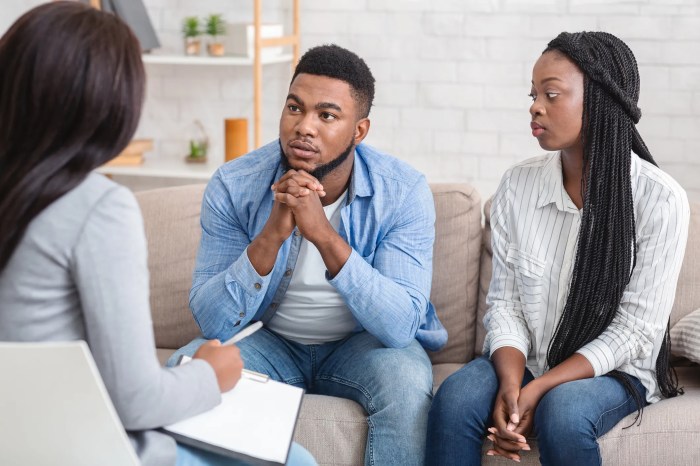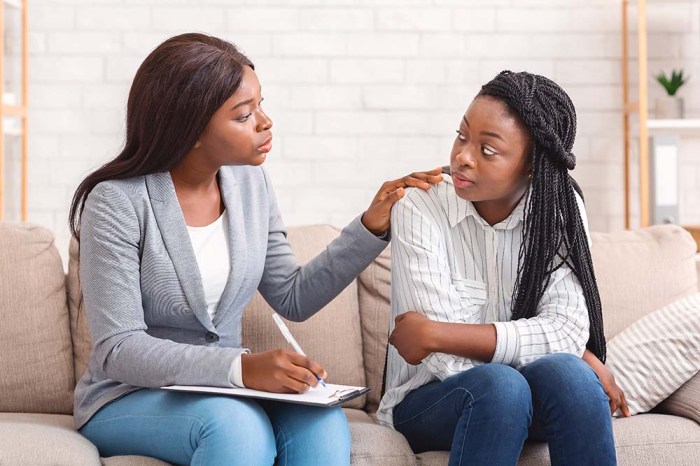During a marriage counseling session the therapist suggests – During a marriage counseling session, the therapist suggests a variety of techniques and interventions to help couples improve their communication, resolve conflicts, and manage their emotions. These techniques can be tailored to the specific needs of each couple, and can help them to build a stronger and more fulfilling relationship.
Marriage counseling can be a valuable resource for couples who are struggling with their relationship. A therapist can provide support, guidance, and tools to help couples improve their communication, resolve conflicts, and manage their emotions. If you are considering marriage counseling, it is important to find a therapist who is experienced and qualified to help you achieve your goals.
Therapeutic Techniques and Interventions
Marriage counseling employs various therapeutic techniques and interventions to facilitate communication, resolve conflicts, manage emotions, and improve overall relationship dynamics.
Gottman Method
- Focuses on improving communication, conflict resolution, and emotional regulation.
- Uses specific tools and exercises, such as the Sound Relationship House and the Gottman Card Decks.
- Benefits include increased understanding, improved communication, and reduced conflict.
Emotionally Focused Therapy (EFT)
- Emphasizes the role of emotions in relationship dynamics.
- Aims to help couples identify, express, and regulate their emotions effectively.
- Benefits include increased emotional connection, improved communication, and reduced distress.
Cognitive Behavioral Therapy (CBT)
- Focuses on changing negative thought patterns and behaviors that contribute to relationship problems.
- Uses techniques such as identifying and challenging distorted thoughts and developing coping mechanisms.
- Benefits include improved communication, reduced conflict, and increased relationship satisfaction.
Communication and Conflict Resolution

Effective communication is crucial in marriage counseling, enabling couples to express their needs, resolve conflicts, and build intimacy.
Active Listening
- Involves paying full attention to your partner, without interrupting or judging.
- Demonstrates respect and understanding, and fosters a safe space for communication.
- Benefits include improved understanding, reduced misunderstandings, and increased connection.
“I” Statements
- Encourages couples to express their feelings and needs without blaming or accusing.
- Helps reduce defensiveness and promote constructive dialogue.
- Benefits include increased self-awareness, improved communication, and reduced conflict.
Conflict Resolution Strategies
- Collaborative Problem-Solving: Couples work together to identify and address problems, focusing on solutions rather than blame.
- Fair Fighting Rules: Establishes ground rules for respectful and constructive conflict engagement, avoiding personal attacks and name-calling.
- Mediation: A therapist facilitates communication and helps couples resolve conflicts in a safe and structured environment.
Emotional Regulation and Management
Managing emotions effectively is essential for healthy relationships. Marriage counseling provides techniques to help couples regulate their emotions and respond to each other in a positive and supportive manner.
Mindfulness
- Involves paying attention to present-moment experiences without judgment.
- Helps couples identify and regulate their emotions, reducing reactivity and increasing emotional awareness.
- Benefits include reduced stress, improved communication, and increased relationship satisfaction.
Cognitive Reappraisal
- Involves challenging and reframing negative thoughts and beliefs that contribute to emotional distress.
- Helps couples develop more positive and constructive perspectives on situations.
- Benefits include reduced anxiety, improved mood, and increased relationship satisfaction.
Emotion Regulation Skills Training
- Provides couples with specific techniques to manage their emotions, such as deep breathing, muscle relaxation, and positive self-talk.
- Helps couples develop coping mechanisms for dealing with difficult emotions.
- Benefits include reduced emotional distress, improved relationship dynamics, and increased well-being.
Goal Setting and Progress Tracking
| Types of Goals | How to Set Goals | Benefits of Goal Setting | Measuring Progress |
|---|---|---|---|
| Relationship Goals | Define specific, measurable, achievable, relevant, and time-bound (SMART) goals related to the relationship, such as improving communication or spending more quality time together. | Provides direction and motivation, improves communication, and enhances relationship satisfaction. | Track progress through regular check-ins, discussions, or journaling. |
| Individual Goals | Focus on personal growth and development, such as improving self-esteem or developing coping mechanisms for stress. | Enhances individual well-being, which can positively impact the relationship. | Monitor progress through self-reflection, journaling, or feedback from the therapist. |
| Joint Goals | Involve both partners working together towards a shared objective, such as saving for a vacation or completing a home improvement project. | Fosters teamwork, strengthens the bond, and provides a sense of accomplishment. | Track progress through regular updates, milestone celebrations, or visual aids. |
Ethical Considerations and Confidentiality

- Maintain confidentiality of client information, except in cases of imminent danger or legal obligation.
- Obtain informed consent from clients before engaging in any interventions or sharing information with others.
- Avoid dual relationships with clients, such as providing therapy and friendship simultaneously.
- Adhere to ethical guidelines established by professional organizations, such as the American Association for Marriage and Family Therapy (AAMFT).
- Prioritize the well-being and safety of clients, intervening appropriately in cases of abuse or neglect.
Cultural and Diversity Considerations: During A Marriage Counseling Session The Therapist Suggests

Marriage counseling must consider the cultural and diversity factors that influence relationship dynamics.
Cultural Sensitivity
- Therapists must be aware of and respectful of different cultural values, beliefs, and practices.
- Understanding cultural norms helps avoid misunderstandings and promotes effective communication.
- Cultural sensitivity fosters a safe and welcoming environment for clients from diverse backgrounds.
Adapting Interventions, During a marriage counseling session the therapist suggests
- Therapists may need to adapt therapeutic techniques to fit the cultural context of the clients.
- For example, using storytelling or group discussions may be more appropriate in some cultures.
- Adapting interventions ensures that they are culturally relevant and accessible to all clients.
Working with Diverse Couples
- Therapists must be prepared to work with couples from different backgrounds and with varying relationship structures.
- Understanding the unique challenges and strengths of diverse couples helps the therapist provide tailored support.
- Working with diverse couples promotes inclusivity and expands the therapist’s knowledge and skills.
FAQ Insights
What are the benefits of marriage counseling?
Marriage counseling can help couples to improve their communication, resolve conflicts, and manage their emotions. It can also help couples to build a stronger and more fulfilling relationship.
What are the different types of marriage counseling?
There are many different types of marriage counseling, including traditional talk therapy, behavioral therapy, and cognitive-behavioral therapy. The type of therapy that is best for a particular couple will depend on their individual needs.
How do I find a marriage counselor?
You can find a marriage counselor by asking your doctor or mental health professional for a referral. You can also search for marriage counselors in your area online.